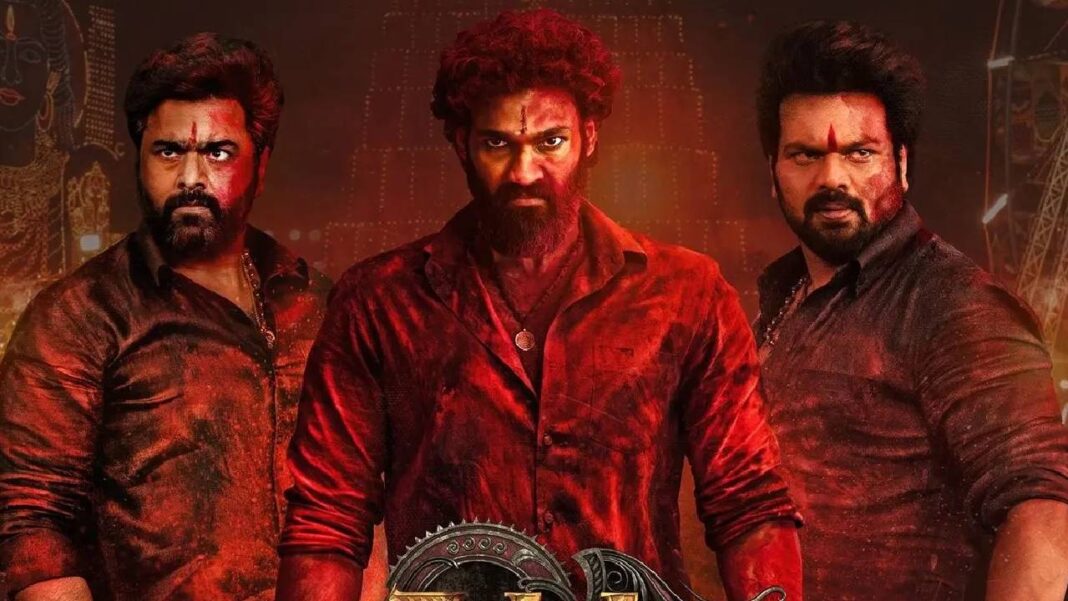Suresh Kavirayani
sureshkavirayani@gmail.com
Three actors—Bellamkonda Sai Srinivas, Manchu Manoj and Nara Rohit—have come together for the film Bhairavam, which released on Friday. Directed by Vijay Kanakamedala, this is a remake of the Tamil film Garudan. The promotional videos were engaging, and the actors aggressively promoted the film. Here’s the story and how it unfolds.
Story
The story takes place in a village in the Godavari district. The Varahi Amma temple in the village owns a thousand acres of land, and the documents for these lands are with Gajapathi (Manchu Manoj) and his friend Varada (Nara Rohit), who manage the property. Gajapathi and Varada share a deep friendship, continuing a bond that goes back to their forefathers. Sreenu (Bellamkonda Sai Srinivas) is an orphan who becomes close to Gajapathi and Varada after a key incident. He becomes an integral part of their lives and especially close to Gajapathi. A minister (Sarat Lohitaswa) sets his sights on these lands and schemes to break the bond between the friends. He approaches one of them in a plot to illegally acquire the land. Can he succeed in breaking the friendship? How does the approached friend react? What does Sreenu do when he discovers the truth? To find the answers, you’ll have to watch Bhairavam.
Analysis
Bhairavam is a remake of the Tamil film Garudan, which is already available on an OTT platform. Director Vijay Kanakamedala largely sticks to the original, making very few changes for the Telugu version. However, the main issue with the Telugu adaptation is its inability to connect emotionally with the audience. While the Tamil version felt more realistic and authentic, the Telugu remake leans toward a typical commercial film, focusing more on the actors than on the story.
In the Tamil version, comedian Soori played the role of the orphan, while Bellamkonda attempted to replicate it in Telugu. However, he doesn’t quite fit the role. His character is also reduced in screen time, and while the second half of the Tamil version is packed with emotion—especially the climax—the Telugu version handles it in a more routine manner.
The story has the potential to explore deep friendships and family bonds, offering emotional resonance, but this film fails to deliver that impact. The director takes a long time to introduce characters, and while parts of the story are engaging, the overall focus shifts to highlighting individual actors’ commercial appeal.
The female lead cast is also a major drawback. The pre-climax scenes are somewhat better narrated, but overall, the film ends up being average and lacks the emotional depth of the original. Forced comedy scenes by Vennela Kishore add little and seem out of place. Some action sequences are well-executed, but there’s little entertainment otherwise. The songs involving Bellamkonda Srinivas and Aditi Shankar appear inserted solely for commercial reasons and feel unnecessary.
Performances
Bellamkonda Sai Srinivas performs sincerely, but his character lacks depth and has limited screen presence compared to the other two leads. Manchu Manoj gets a meaty role and stands out among the three. Though he appears over-the-top in a few scenes, his voice and screen presence are strong, marking a good comeback. Nara Rohit plays a role that fits him well, delivering a grounded and neat performance.
Among the female leads, Aditi Shankar is well-cast as a village girl and brings energy to her role. Anandi doesn’t get much scope to perform. Divya Pillai was supposed to deliver an emotional performance in the final half-hour, but the writing didn’t support her character well. Ajay plays his typical villain role, and Vennela Kishore’s comedy is ineffective and boring. Sampath Raj is adequate as a police officer. Sarat Lohitaswa, Raja Ravindra and other supporting actors have little impact.Technical Aspects
Technically, the film is strong with high production values. The temple set looks authentic and convincing. Cinematographer Hari K Vedantam captures the rural backdrop beautifully. The songs are just average, but the background score is effective. The dialogues fail to leave an impression. Action choreography is a plus.
Verdict
Bhairavam works in parts but fails overall—especially when compared to the Tamil film Garudan. It misses the emotional core and instead focuses on building up individual actors. Although the story is inherently emotional and rooted in themes of friendship and loyalty, the direction falls short of conveying it effectively. In the end, Bhairavam is an average film with missed opportunities.
Cast: Bellamkonda Sai Srinivas, Manchu Manoj, Nara Rohit, Aditi Shankar, Divya Pillai, Anandi, Sarat Lohitaswa, Jayasudha, Ajay, Sandeep Raj, and others
Music Director: Sricharan Pakala
Cinematographer: Hari K Vedantam
b KK Radhamohan
Screenplay and Director: Vijay Kanakamedala
Rating: 2.5/5




